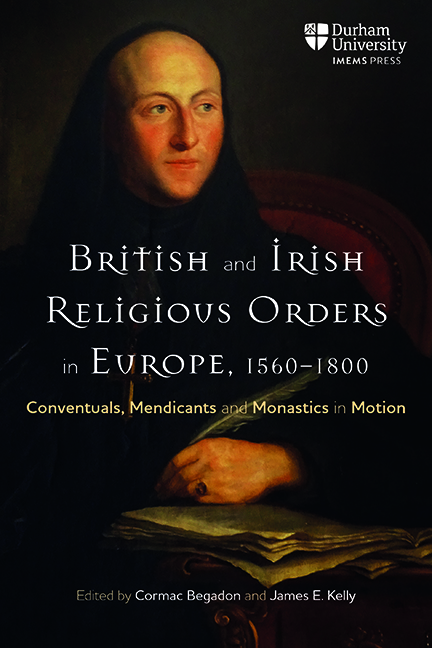 British and Irish Religious Orders in Europe, 1560-1800
British and Irish Religious Orders in Europe, 1560-1800 Published online by Cambridge University Press: 07 October 2022
Writing to one of his brother monks in September 1790, Augustine Kellett, a senior figure at St Edmund’s, Paris, referred, rather despairingly, to the English Benedictine monasteries in exile as ‘our expiring congregation’. Kellett's comments were undoubtedly framed by the rapidly worsening political situation that he then was living through and by the increasing incursions made by the revolutionary government on religious communities in France. However, whilst then current events were especially worrying, his despondency may also have been shaped by the much longer evolution that monasticism underwent in the eighteenth century in the shadow of the Enlightenment. To some a lamentable malaise that worked against the unity and long-established traditions of monastic life, whilst to others a modernisation and engagement with changing ways of philosophical and scientific knowledge, monasticism's engagement with the Enlightenment had nonetheless long-lasting consequences. Changes were, of course, not limited to the houses of the English monks, but their experiences were part of a much wider phenomena that had been replicated in male monasteries the length and breadth of Catholic Europe.
From a purely numerical perspective, the English Benedictines underwent a period of undeniable contraction in the eighteenth century. There were 293 professions spread amongst the four houses for the years 1700–1800, which represented a significant drop from the 512 in the previous century.4 By the time revolution in France arrived at the doors of their houses in 1789, it has been suggested that they were all experiencing a serious decline in new entrants that was putting their future existence in doubt. One commentator has suggested that this downturn amounted to a ‘sharp reduction’, which resulted in a ‘corresponding nosedive of morale’ amongst the houses. Some monks certainly did fall victim to the seductions of revolutionary politics and elements of Enlightenment thought put an unenviable strain on religious life, while others succumbed to more conventional carnal and intoxicant temptations.
Yet whilst the Congregation was faced with considerable challenges, both from internal and external forces, it responded actively in a number of ways which attempted to ensure its future existence.
To save this book to your Kindle, first ensure [email protected] is added to your Approved Personal Document E-mail List under your Personal Document Settings on the Manage Your Content and Devices page of your Amazon account. Then enter the ‘name’ part of your Kindle email address below. Find out more about saving to your Kindle.
Note you can select to save to either the @free.kindle.com or @kindle.com variations. ‘@free.kindle.com’ emails are free but can only be saved to your device when it is connected to wi-fi. ‘@kindle.com’ emails can be delivered even when you are not connected to wi-fi, but note that service fees apply.
Find out more about the Kindle Personal Document Service.
To save content items to your account, please confirm that you agree to abide by our usage policies. If this is the first time you use this feature, you will be asked to authorise Cambridge Core to connect with your account. Find out more about saving content to Dropbox.
To save content items to your account, please confirm that you agree to abide by our usage policies. If this is the first time you use this feature, you will be asked to authorise Cambridge Core to connect with your account. Find out more about saving content to Google Drive.